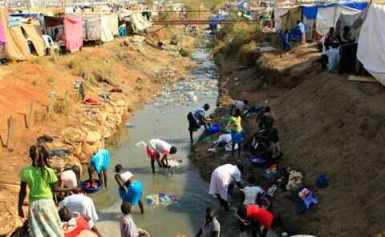South Sudan capital hit by drinking water shortages
April 26, 2015 (JUBA) – Residents in the South Sudanese capital, Juba, say there is no clean drinking water in the city which serves as the seat of the government, citing scarcity of bottled water as the cause.

However, residents say it has recently become difficult to find bottled water from the shops in the city and that traders had also resorted to rationing the water.
“Life is grinding to a halt here in Juba. Bottled water is becoming a scarce commodity in the market. Yesterday (Saturday) I had to move to several shops before getting a couple of bottles. This evening, it was even worse. I got a shop with 20 bottles of 1.5 litres and paid for all but the shop keeper returned my money and said he would only sell one bottle for one person,” said a Juba resident.
He also said people wanted to resort to drinking unclean water from the river, adding that fetching the water was also difficult as water tankers which are mainly driven by foreign traders hardly find fuel in order to operate.
He said besides the need for water to drink and cook with, other concerns including hygiene were being factored in.
“This means taking shower [for] hygiene purposes and to go for work, getting public transport and water for cooking at homes will be a little far from the reach of the ordinary citizens in town,” he added.
Traders who manufacture bottled water on the other hand blamed the situation on scarcity of fuel and hard currency such as US dollars in order to purchase raw materials used for production, forcing some factories to shut down.
Nelson Achiek, manager of Cool Water Factory, told the UN-run Miraya FM radio that the company he ran was the only one still in business as his competitors have halted production, warning that even his company may be forced to shut down.
“In actual sense I will not afford to supply all of them but the little that have I will serve whoever needs water. I will give all that I produce because per day I am producing 3000. We are just eyeing on government to do something because it is something beyond our capacity,” he said.
Dollar exchange rate has sharply risen to nearly 10 South Sudanese pounds (SSP) per one dollar as the country has exhausted is foreign reserves while production of oil has reduced due to the ongoing war.
The young nation imports most of commodities including fuel from the neighbouring countries.
(ST)
